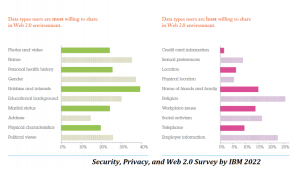Decentralized Data, NFT Tokenization & Crypto to Fuel Web 3.0 in 2023
Jasmy is one of the emerging platforms using this data decentralization model for Web 3.0. The platform enables people to trade data with consent.
UNITED STATES, May 8, 2023/EINPresswire.com/ -- The current world wide web, or Web 2.0, seems perpetually high on data sharing and omnipresent social networks. This ecosystem has a clear bias toward big corporates such as Google and Meta. In comparison, Web 3.0 sounds a bit revolutionary, giving back people control by decentralizing data and restricting manipulative advertising. For content creators, and the real doers behind the art, music, or any other product created with real skills, the emergence of Web 3.0 means a chance to profit directly with lesser interference and control of platforms and agencies that tend to influence marketplaces & make apps manipulative. An inherent part of Web 3.0 are NFTs that tokenize control, exemplified by cryptocurrency, and offers more transactional control via decentralization of data. For consumers there is a promise of more sovereignty & security with Web3 and 2023 might be the year when this digital transformation moves beyond its nascency and is endorsed by businesses, people, and brands."One of the big innovations of Web3 are tokens; both fungible and non-fungible assets that are inherently unique…" says Avivah Litan, Vice President, and Analyst at Gartner, about the tokenization of real-world assets such as real estate, using blockchain technology
It is common to find people explaining tokenized ownership by referring to celebrities who have released memorabilia and collectibles enabled by NFTs. But this is just one of the many applications of tokenized ownership.
Gartner predicted that nearly 25% of enterprises would have experimented with or adopted decentralized Web 3.0 applications by 2024, of which NFTs or non-fungible tokens are a notable example. NFT tech invariably leverages the benefits of using blockchain. There is a lot of talk about easier, less complicated NFT creation as more NFT projects are gaining attention and increasingly, typical barriers to launching NFTs should be removed. 2023 might see NFT gain WordPress-like success. This should help NFTs break free from contract developers just like WordPress liberated website & web store creation/management from individual developers and coders. Some people might say that mass innovation is not possible in NFT as it requires too many layers of tech but once the open architecture is truly out there, it does not take much time to have third-party tool integrations to make the functionalities and features simpler. This should encourage younger, more creative, and out-of-the-box NFT creators. This will also encourage more entrepreneurs to embrace NFTs, indirectly paving the way for a Web3 world where the importance will not be on who launched the technology or the tech owners, but instead, the focus will be on the use of technology sans barriers.
2023 could be the breakthrough year when NFTs truly leverage the blockchain technology advantage and take NFTs to other domains like fleet management or event management. The bigger enterprises are not ignorant of this trend, and many have been experimenting with NFTs. 2023-24 could see the emergence of the big brands moving beyond just NFT collections, driving quicker, more agile NFT launches. Adidas did something similar when it released its NFT collection that industry watchers could not have predicted. NFTs were already trending from 2021 but 2022 was not the best year for this technology to take its biggest leap. Still, some events marked the true arrival of NFT tech in 2022 with Alfa Romeo using NFT tokens for its Tonale model—a one-of-a-kind effort but it did grab the headlines and helped to put NFT on the map for some decision-makers who were not very sure about its adoption.
When the financial services giant, Goldman Sachs made its $100 million bet on blockchain bonds, it was obvious that now the big tech companies and other organizations too are realizing the worth of blockchain and the reality that it is bound to become a part of most digital interactions. The decentralization of data opens a world of possibilities, challenges, and disruptions. It is surely going to make its presence felt in a big way for businesses both large and small as well as everyday internet users. In recent years, organizations have had to answer too many questions related to data security and privacy concerns—even the almighty Meta has been questioned about the level of data security it provides to users who do not want their data tracked by advertisers.
As Web 3.0 spreads, the use of cryptocurrencies should become an inherent part of an emerging environment where data ownership can be argued and seeks repeated verification. Blockchain technology platforms exemplify the simplicity and beauty of this concept. It creates more immunity against shopping preferences, healthcare information, or personal-financial data being tracked and used by infiltrating advertisers. Facilitating online payments with near negligible transaction fees makes data decentralization easy to adopt without any usability costs upfront.
In his Web3 Lecture, Hidehiko Kakinuma, Executive Officer of Jasmy - the tokenized platform referred to as Japan's Bitcoin, says, “Not only for food and logistics but also for carbon credits! Traceability realized by blockchain also includes semiconductors, Japanese sake, and SDGs.”
People who are still figuring out why the cryptocurrency is being hailed as the next big thing despite some vulnerabilities of the crypto-trading marketplace should realize that decentralized currency cannot be held down by government regulations. Users get a digital asset that offers more financial privacy using Distributed Ledger Technology (DLT) and takes away the dependence on a handful of digital wallets or payment systems. Crypto is positioned to become an inherent part of a decentralized ecosystem because Web 3.0 needs a trustworthy currency or payment system, and crypto owners and creators realize that cryptocurrency will become an essential asset as Web 3.0 takes a larger shape. Jasmy is one of the emerging platforms using this data decentralization model. Jasmy is more than cryptocurrency as the platform enables people to trade data with consent, without fearing any norms imposed by big corporates and similarly. By taking a cue from how Jasmy or Fireblocks, CertiK, Casa, and QED-it makes cryptocurrency a perfect way to overcome transactional challenges, businesses can extract the real advantages associated with data decentralization rather than interpreting it as a technical revolution bound to challenge the way they operate.
User data is critical for audience profiling, and if it is not easily available to brands, spammers, hackers, and aggressive advertisers, people are less likely to be harassed or influenced into making purchasing or spending decisions. Data decentralization does away with maintaining a central warehouse of data that can be further accessed by different users, ranging from data-harvesting advertising agencies to publishing syndicates. Decentralized data means more distribution of data across multiple points. It does away with the concept of bigger corporations creating their own rules for accessing or using such data. Users get better safeguarded against data-related tracking, targeted advertising, and other forms of informational exploitation. Centralized data is more prone to data theft and breach. When data is safely warehoused across multiple nodes, it automatically becomes better guarded against malicious intent. Without a central server controlling the data, a data breach is likely to have a lesser impact and it will open the room to quickly scale up the security protocols for other nodes where data is being saved.
Blockchain-based platforms like Calvaria, Jasmy, Ripple, and IMPT are increasingly allowing users to store, share, or trade their digital assets that are protected by blockchain-based protocols. However, data democracy is not likely to happen within a predicted timeframe. There are surely challenges related to people owning and managing their data. For starters, the infrastructure of it might sound overwhelming to many. For organizations, dumping their existing work models or integrating blockchain-enabled platforms within legacy systems/processes might seem like a disruption. Incorporating AI into such emerging ecosystems might not find favor with everybody as people could have reservations about the increasing role of AI in an IT infrastructure that manages critical data.
Web3 might not be put into use right away in every part of the world, but it does offer the promise of providing users with a digital identity—something that social avatars cannot. Digital identities can be important for people who are wary about their data being accessed and those who want a definitive identity as Web3 spreads. It would be realistic to expect a couple of cryptocurrency platforms to come up short of the expectations in 2023 but like every tech adoption stage, this is expected—nobody has predicted that Web3 is flawless. But the shortcomings of crypto could be more due to human intervention and not due to any native drawbacks in blockchain technology. There might be a need for some sort of blockchain regulation that does not compromise data democracy but still protects against fraudsters.
A lesser-discussed aspect of the web’s evolution is the role of big brands and big tech companies. Some people might believe that the support for Web 3 is coming more from the consumers, but this increasing adoption of data democracy is being driven by some big brands. Global conglomerates like Reddit made this obvious when they registered nearly 5 million users using NFTs in 2022 and while this number might seem big, it might be just a teaser for what lies ahead. Even Instagram has started NFT purchases within its application but the number of creators using this tech is humble right now. The obvious question is how long it will take for Snapchat, Amazon, or Google to get more serious about NFTs.
When the bigger brands talk about and embrace Web 3.0, more consumers are likely to consider this as a necessary evolution and this is beyond the scope of cryptocurrencies. NFTs for luxury goods, boutique items, vintage art, luxury cars, and sneakers are gaining momentum and this trend also makes consumers realize that they are getting complete ownership of an asset and the ownership status can be verified via blockchain. Though this NFT-enabled marketplace is growing slowly, it is making the non-believers take a second look at the advantages of blockchain-fueled tokenization—a trend that continues to grow and is expected to become faster and cheaper as the technology takes a quantum leap during 2023-24.
Web 3.0 and data democracy might face the most obvious challenge—its unrealized potential. Harvard Business Review highlights how data democratization is not just about bringing more parity to controlling user data, and it is in fact useful for organizations. Published in June 2022, this insight from Hbr.org talks about a global brand, Novartis that was among the early investors in enterprise digital transformation. The Swiss pharmaceutical giant pursued new data platforms & integration and was also competitive in leveraging AI. Despite this and the increasing role of data scientists, many managers within the organization were not extracting the benefits associated with data transformation and most teams were not enhancing their performance despite the integration of innovative technologies. This underlined a significant realization that most organizations might not have as they kickstart or further expand any digital transformation story. Just having a team of top-rated technologists aboard or sounding optimistic about an emerging tech does mean an increase in efficiencies unless people across various roles understand how the tech can uplift their performance.
Data democracy promises something similar and has closely matched challenges. When tokenized, a consumer’s data is better protected but people need to understand this beyond the perspective of crypto trading. Data democracy at an organizational level means that AI and blockchain-enabled tokens and information nodes can provide information to key decision-makers without going through the process of seeking access or requesting reports. However, to use this as a tool to fuel better decision-making, managers need to be trained into using the technology rather than feeling overwhelmed about it—decentralized data, NFT tokenization & crypto that will lead Web 3.0 in 2023 too need a similar realization, as this digital maturity cannot be bought, traded, or taught in classrooms.
Tony Peacock
LinkDaddy®
+1 305-399-9423
email us here
Jasmy Platform PRV
Legal Disclaimer:
EIN Presswire provides this news content "as is" without warranty of any kind. We do not accept any responsibility or liability for the accuracy, content, images, videos, licenses, completeness, legality, or reliability of the information contained in this article. If you have any complaints or copyright issues related to this article, kindly contact the author above.



